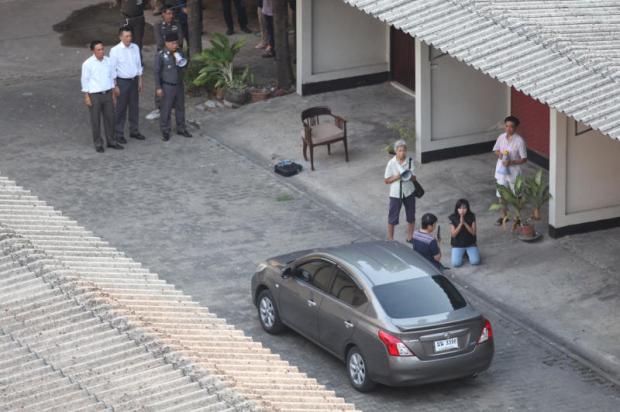
Weerachai Phutdhawong is a whistleblower. For nearly a decade now, he has helped expose scam networks that sell fake degrees to "certify" unqualified university lecturers.
Mr Weerachai, an associate professor of chemistry at Kasetsart University, has no background in criminology or investigative work. But he's borne witness to issues concerning lecturer qualifications throughout his whole career.
He's thus made it his mission to combat con lecturers who rely on fake certificates to teach university students their subjects of "expertise".
In 2008, he founded the Coordinating Centre for the Public Higher Education Staff (CHES) with the purpose of helping public university staff who have suffered institutional mistreatment and calling out people who have abused the system, including those who have used fake degrees.
Last month CHES succeeded in exposing a con network in Chiang Mai that sold fake academic degrees from universities overseas. With help from the Department of Special Investigation (DSI), CHES successfully busted the operation.
The organisation has no legal leverage to investigate these cases. However, it can help provide advice and process complaints, which it can then share with the DSI.
Mr Weerachai now receives an ongoing stream of leads into fake degree cases, including the high-profile World Peace University scandal that made headlines in 2013.
The case helped forge a working relationship between CHES and the DSI, allowing them to bring falsely certified lecturers and the profit-driven agents behind them to justice.
"In order to earn the title of a professor, one must have a PhD, an outstanding research background or an exceptional body of academic work," Mr Weerachai explained.
"Then the title will be approved and granted by the King. But all these so-called lecturers did was pay some money and get appointed to a position that usually takes at least a decade to earn."
HIGH-PROFILE CELEBRITIES
In 2013, CHES found out that the freshly launched World Peace University was a bogus institution issuing fake honorary degrees.
Mr Weerachai first learned of the university when watching news of its upcoming commencement ceremony at a Bangkok hotel unfold on TV in 2013. Several celebrities were reportedly set to receive honorary degrees from the university.
But after a quick internet search, Mr Weerachai could not find any information about the school's location.
Getting suspicious, he raised his concern with the DSI, requesting that they delay the ceremony until proof of the school's physical location could be found.
Shortly after, the ceremony was cancelled. At the same time, the event's organisers went quiet and could no longer be contacted by the press.
It turned out the World Peace University had been unauthorised all along.
From this point on, Mr Weerachai worked closely with the DSI to bust these bogus operations.
"We now have plenty evidence that proves fake degree operations do exist across Thailand," he says. "It's sad because there are many universities who employ teachers with fake masters or doctorate degrees to be part of their faculty.
"We would find letters recommending these people for lecturer positions from the university they supposedly graduated from, but when I checked with the actual university, they didn't even have that person's name in their database."
The degrees in question are mainly based in law, social sciences, public affairs, engineering and music.
CHES has had at least three successfully resolved cases of fake degrees, including the World Peace University one.
In one recent case, the found an online agency located in Chiang Mai province's San Kamphaeng district. After news of the agency's practices broke out, its website was immediately shut down.
More than 300 university teachers have had their degrees traced back to this website, says Mr Weerachai.
Another case involved a woman who was accused of using a fake degree from the real Britain-based Southampton University to launch her lecturing career at a northeastern university.
The woman told PPTV in Chiang Mai that she was duped by an agent who claimed she could get a PhD and write a thesis through an online course.
The lecturer's name was not disclosed in the TV broadcast.
"PhDs do not have to do coursework," she told the reporter. "I thought I could finish the degree by just writing it in Thailand."
The lecturer said she had never been to Britain before.
She finished her online PhD in philosophy from Southampton University in 2014 before getting a qualification from the Universal Ministries of the King's College in Florida in 2016.
Afterwards, she used her degree to land a public university lecturer position. However, she later resigned when CHES requested a review of the validity of her certificate.
Southampton University later denied she had got a PhD from the institution. She was then dismissed from her post.
The DSI has since investigated the agency website that the woman had used to get her "degree".
The website claims to connect Thai students with international universities. Graduate degrees are advertised as being doable within six months to two years.
The lecturer said she was not a part of the con agent's operation.
"I am a victim," she told PPTV.
Despite having been able to successfully identify fake certifications, Mr Weerachai says that some universities he has dealt with continue to keep the unqualified individuals on staff.
CHES is currently dealing with seven outstanding certification-related cases that it is close to concluding.
"These fake degrees tend to be issued by real universities outside of Thailand because it is more difficult to check the legitimacy of the degree from afar and most universities don't even bother to double check anyway," Mr Weerachai said.
"These degrees often cost around 225,000 baht in tuition fees and people can use it to later apply to be a university's teacher with ease."
LECTURERS SHOT DEAD
A shooting at the campus of the Phranakhon Rajabhat University in Bang Khen in May of last year was said to involve private accusations levelled against a professor for having a fake degree.
Wanchai Danaitamonut, 60, shot dead two fellow lecturers, Pichai Chaisongkram and Nattapol Chumworathayee, both 50 years old. The shooting took place at a university lecture hall before a graduate-level exam was scheduled there. Wanchai fled the scene but later shot and killed himself with his 9mm pistol during a stand-off with police.
Pichai was the chairman of the examination committee, while Nattapol was an adviser.
TV news reports suggested that one of the motives for the murders were that Wanchai was suspicious that Pichai, his colleague, held fake certifications for his position. According to Thai PBS news, Pong Horadon, the Phranakhon Rajabhat University rector, told Bang Khen police that Wanchai and Pichai had raised questions about the validity of Wanchai's academic degree around a year ago.
Mr Pong said that he had invited the two lecturers to come settle the dispute with him.
Wanchai had supposedly uncovered documents which cast doubt on the validity of Pichai's academic teaching credentials.
Pichai had obtained his PhD from the Philippines. Wanchai was concerned that his colleague's overseas degree had not been approved by the Office of the Higher Education Commission (Ohec). >>
>> However, when Mr Pong requested a review of the credentials, Ohec determined that Pichai's PhD was indeed valid and recognised by the office.
Since the incident, Mr Pong had not spoken to either men.
Last week the police investigators involved in the case told Spectrum they were no longer trying to determine the motive of the shooting since both parties were dead.
It wasn't the first incident concerning suspicions about fake degrees at the university.
However, people are increasingly scared to be a whistleblower because those who file complaints have been fired or else publicly shamed for seeking to "defame" others. That's where CHES has intervened. More than 80 public universities now rely on the third-party organisation to deal with complaints, said Mr Weerachai.
POWERFUL PEOPLE
The scope of CHES' work isn't only limited to the academic world. It has dealt with fake certificates in many different fields.
Mr Weerachai cannot name specific industries but he can confirm that he has dealt with powerful, high-profile people.
"I've got all kinds of threats from people who are affected by our crackdowns on their operations," says Mr Weerachai.
"Some of them have told me to stop doing what I'm doing, otherwise they will try to make me go to jail. Some people have said they will kill me if I don't stop. But I'm not afraid and I won't stop."
Fake certificates became more widespread after 1999 when the government cut subsidies to public universities, says Mr Weerachai.
They had to quickly hire more staff to fit the new required ratio of one lecturer per every five students at the graduate level.
Currently, public universities have a total of 200,000 staff members. However, a vast majority of them -- specifically, 180,000 of those employees -- including lecturers, are not full-time government employees.
Many of these lecturers have been hired based on the number of students enrolled each semester.
"The university registrar does not usually check the origin of the academic certificate of these part-time lecturers. They simply tend to look at whether the name of the university is accredited by Thailand's higher education office," said Mr Weerachai.
Mr Weerachai told Spectrum that there are three main ways fake certificates are issued in Thailand -- selling fake degrees outside Thailand online, setting up a fake university to sell the degree and getting the degree from low-quality shop house universities.
One of the most popular fake degrees that people are familiar with are the ones sold on Khao San Road.
"One thing I have to admit is that some of the lecturers who are holding the fake degrees are actually good teachers. They have outstanding teaching techniques," said Mr Weerachai.
"But still, I think to get such high-ranking academic positions, they have to earn it instead of simply paying for it."

teaching a lesson: Weerachai Phutdhawong, a chemistry lecturer at Kasetsart University, helps investigate leads about lecturers with fake certifications. (Photo by Chaiyot Yongcharoenchai)



praying for life: A female relative of Wanchai Danaitamonut, who fled after killing two fellow lecturers, begs on her knees for Wanchai to surrender during a police stand-off in May last year. (Photo by Thiti Wannamontha)